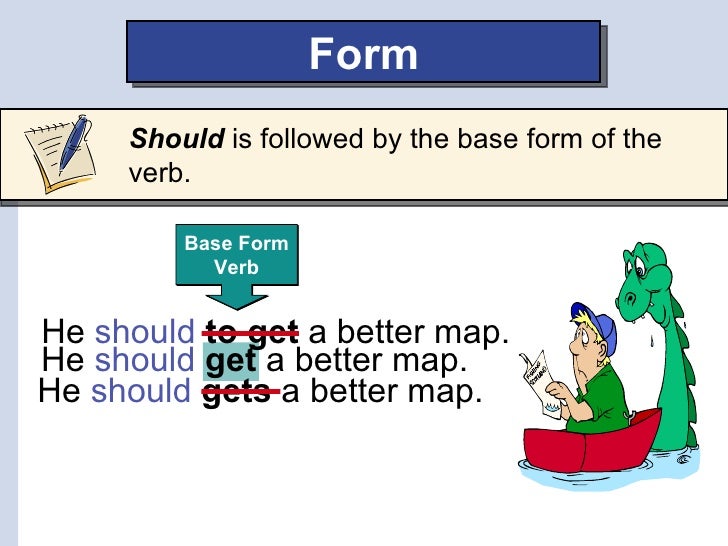SHOULD / SHOULDN'T HAVE
SHOULD / SHOULDN'T HAVE

Should
Se usa "should" para dar o pedir consejo o para dar opiniones en el presente:
- "I have a terrible stomachache." "You should go to the doctor's."
- "I haven’t heard from my father." "You should call him."
- "She's not happy with the salary offered." "She shouldn't accept the job."
Forma
Se usa "should" / "shouldn't" + el infinitivo del verbo principal (sin "to")
Ejemplo
| I You He, She, It We They | should | do | more exercise. |
| get | a new car. | ||
| shouldn't (should not) | smoke. | ||
| spend | so much money. |
| Should | I you he / she / it we they | get | more qualifications? |
| wear | something different? |
Should have
Se usa "should have" para dar su opinión o pedir su opinión en el presente en relación a algo que sucedió en el pasado:
- "I had a terrible stomachache." "You should have gone to the doctor’s."
- "I didn’t hear from my father last week." "You should have called him."
- "She isn't happy with the salary she’s getting." "She shouldn't have accepted the job."
Forma
Se usa "should" / "shouldn't have" + el participio pasado del verbo principal
Ejemplo
| I You He / She / It We They | should have | taken | a taxi. |
| shouldn't have | written | that comment. |
| Should | I you he / she / it we they | have worked | overtime? |
Práctica
Dar o pedir consejo usando el verbo entre paréntesis:
We can use 'should have' to talk about past events that did not happen.
- I should have let her know what was happening but I forgot.
- He should have sent everybody a reminder by email.
- They should have remembered that their guests don't eat pork.
We can also use 'should have' to speculate about events that may or may not have happened.
- She should have got the letter this morning. I expect she'll give us a call about it later.
- He should have arrived at his office by now. Let's try ringing him.
- They should have all read that first email by this stage. It's time to send the next one.
We can use ' should not have' to speculate negatively about what may or may not have happened.
- She shouldn't have left work yet. I'll call her office.
- He shouldn't have boarded his plane yet. We can probably still get hold of him.
- They shouldn't have sent the report off for printing yet. There is still time to make changes.
We can also use 'should not have' to regret past actions.
- I shouldn't have shouted at you. I apologise.
- We shouldn't have left the office so late. We should have anticipated this bad traffic.
- They shouldn't have sacked him. He was the most creative person on their team.
Should and Shouldn't - Use
ExamplesYou look tired. I think you should take a few days off.Alice works very long hours. She should to talk to her boss. - I have an English test tomorrow. - I shouldn't worry if I were you. You have worked really hard. - I never have enough money. - I don't think you should go out so much. Should - Quick Grammar NoteTo give advice to someone you can also say:
When you regret not doing something in the past, you can say:
We use should have + past participle to talk about things we regret.
I got really wet walking home last night, I should have taken an umbrella.
The speaker did not take an umbrella when she went out last night so she got wet. She regrets that she did not take her umbrella.
Regret (verb/noun) is to feel sorry about something that happened or did not happen in the past.
I should have called you sooner.
You should have spoken to me before deciding.
Sarah talked all the way through the movie. I should not have invited her to the cinema.
I'm really tired today. I should not have stayed awake so late last night.
I shouldn't have shouted at her.
Now read through these regret sentences and type in the correct past participle verb:
|
Comentarios
Publicar un comentario